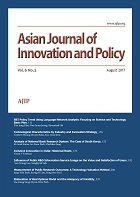Sudent Factors on Employment of Engineering Graduates: A Korean University Case
Abstract
This study analyzes the determinants on employment of 4-year college graduates. Data were collected from nine semesters from 2009 to 2014 totaling 4,176 engineering graduates of University ‘A’ in the capital area of Korea. Employment is analyzed on three levels reflecting the quality of employment such as total employment, preferred jobs and the top 500 companies. Eighteen variables were divided into four categories such as private attributes, curriculum activities, non-curriculum activities, and job preparation activities. The Hierarchical Logistic Regression Model was used. The results are as follows: top determinants included in each definition of employment are departments group, gender, employment program, and internship program. Also, grade points in major and basic courses were added as a result of curriculum activities. There is no statistical significance in household income, club activities and employment preparation activities. Also, the curriculum for major intensive courses and multi-majoring imposed by the university are not effective.
- keywords
- Engineering department, college graduates employment, employment determinant, quality of employment
참고문헌
A University (2015) Analysis of 2014 K-CESA Test Results.
A University (2015) Rules for Curriculum.
A University (2015) Rules for Engineering Education Courses.
A University (2015) Analysis of Employment Statistics.
Baek, P.G. (2013) A study on the relationships and characteristics between essential skills and individual variables of college students, Liberal Arts Education Research, 7(3), 349-387.
Chae, C.G. and Kim, T.K. (2009) Studies on determinants of college graduates’ employment, Journal of Vocational Education Study, 28(2), 89-107. (in Korean)
Chae, G.M. (2007) An analysis of employment and wage level of college graduates, Korean Academy of Social Welfare, 59(4), 35-61.
Chae, G.O. (2007) Studies on determinants of college graduates’ employment and wage level, Korean Social Welfare Studies, 59(4), 35-61. (in Korean)
Cho, J.S. (2011) Influence of student information on college graduates’ employment, Korean Data Information Science Journal, 22(5), 849-56. (in Korean)
Cho, K.H. and An, H.Y. (2014) A test for the determinants of jobless period of college graduates, paper presented at the 2014 Conference on Employment Panel, 441-461. (in Korean)
Cho, H.S. and Kim, A.N. (2014) Individual and institutional factors affecting college graduates' wages at the first job, Journal of Educational Research, 12(4), 263-280. (in Korean)
Cho, Y.H., Kim, B.C. and Kim, B.J. (2008) Analysis on influence factors of college graduates’ employment, Education Administration Study, 26(2), 437-462. (in Korean)
Choi, I.S. (2013) A study on Employment and Its Determinants of College Graduates, Dankook University, PhD Dissertation. (in Korean)
Chung, S.H. (2004) A study on core competency, job satisfaction and organizational commitment of secretary, Journal of Secretarial Science, 13(1), 23-43.
Chung, T.Y. and Lee, K.Y. (2005) A study on determinants of employment of college graduates, Management Education Study, 8(2), 159-84. (in Korean)
Hanyang University Homepage (2015) 2014 Summary of Internship Program (HY-WEP). http://www.newshyu.com
Hwang, Y.J. and Paik, B.B. (2008) Determinants of college graduates’ labor market performance, Journal of Employment and Skills Development, 11(2), 1-23. (in Korean)
International Labor Organization (ILO) http://www.ilo.org.
Kim, B. and Seo, H. (2013) Analysis on individual/college factors that influences graduates’ employment, Journal of economics and finance of education, 22(4), 243-68. (in Korean)
Kim, J.S. (2009) College graduates’ difference in the activity of employment preparation and employment, Educational Science study, 40(1), 141-65. (in Korean)
Korea Employers' Federation (2013, 2014) Survey of Recruitment, November, each year.
Korea Employers' Federation (2014, 2015) Trend and Prospect of New Recruitment, May, each year.
Korea Employment Information Service (2013) Manual for Job Guidance Program for Youth. (in Korean)
Korea Employment Information Service (2014) Among the Young Generation,
Korea Education Development Institute (2014) Education Statistics. http://kess.kedi.re.kr/index.
Korean Educational Development Institute (2014) Korean Education Statistic Service. http://kess.kedi.re.kr/index) (in Korean)
Lee, G.H. and Kim, K.G. (2008) Determinants of employment pattern of college graduates’ first jobs, Study on Korean Education, 14(3), 87-111.
Lee, K.Y. and Kim, K.K. (2008) Determinants of first job of college graduates, Korean Educational Study, 14(3), 87-111. (in Korean)
Lee, Y.M., Lee, Y.Y. and Lim, J.Y. (2014) A study on determinants of college students’ preferred job, Social Science Research, 53(1), 337-74. (in Korean)
Ministry of Education (2014) 2014 OECD Education Indicators, September.
Moon, S.S, and Noh, S.W. (2013) Effects of college factors on employment, Education Comprehensive Study, 11(3), 75-94. (in Korean)
Nam, K.G., Yoon, J.H. and Lee, S.Y. (2010) Effect of students activities on the performance of labor market, Journal of Development of Korean Economy, 16(1), 143-172. (in Korean)
National Statistics Office (2012) http://kosis.kr/statHtml.
Noh, K.R., Park, Y.H. and Huh, S.J. (2011) Effects of experiences in career path development service of universities on employment after graduation, Education Research, 49(1), 63-92. (in Korean)
Noh, K.R. and Huh, S.J. (2014) Determinants of job target of college graduates, 2014 Conference on Employment Panel, 3-26. (in Korean)
Oh, H.Y (2014) The Changes of Preferred Job and Employment of New Generation Over The Past Decade, KRIVET Issue Brief, Korea Research Institute for Vocational Education & Training, November, 2014.
Oh, J.I. (2011) Causes of Over-Education Phenomenon and the Way of University Restructuring, KERI Brief, 11-20, July, 2011.
Park, C.K. (2015) An Empirical Study on the Student's Determinants on Employment of Engineering College Graduates, Doctoral Thesis, Hannam University.
Park, G.Y. and Chun, Y.M. (2009) Determinants of college graduates’ employment, Recruiting and Occupation Study, 3(1), 29-59. (in Korean)
Park, G.Y. (2009) An analysis of educational needs for college students’ career path development, Career Path Education Study, 22(2), 181-98. (in Korean)
Park, H.B. (2012) A Study on the Employment Gap of College Graduates after the Generalization of Higher Education, Doctoral Dissertation, Seoul National University.
Park, H.B. and Kim, S.S. (2011) An analysis of personal background, job preparation effort and college rank on the performance of labor market, Education Sociology Study, 21(3), 77-98. (in Korean)
Song, Y.N. (2011) Changes of the regional distribution of good jobs and the determinants of the transition, Korea Local Administration Review, 25(3), 313-342.
- 90다운로드 수
- 218조회수
- 0KCI 피인용수
- 0WOS 피인용수


